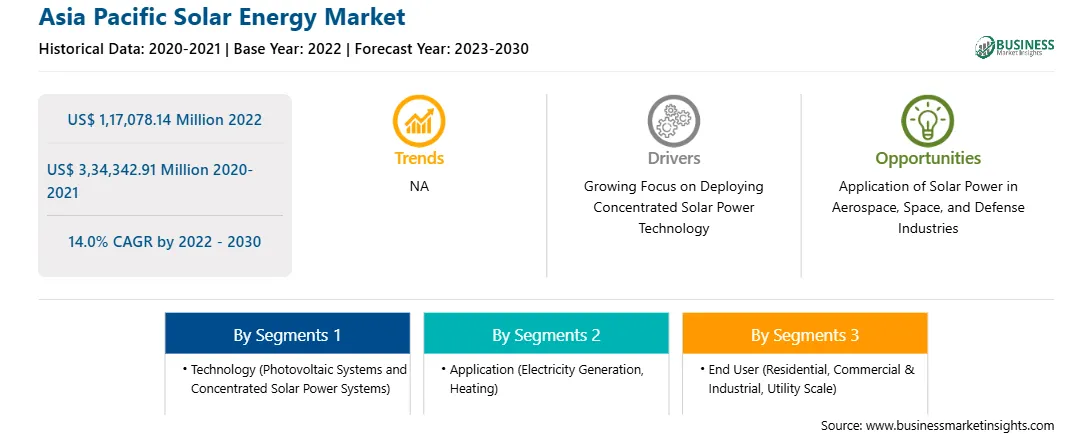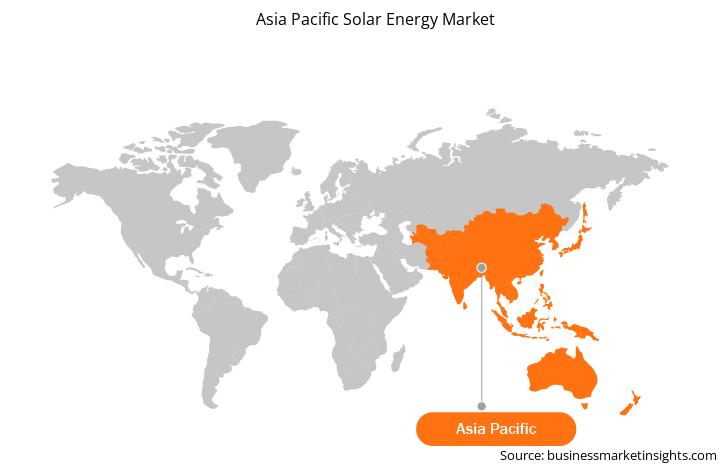亚太地区太阳能市场预测至 2030 年 – 区域分析 – 按技术(光伏系统和聚光太阳能发电系统)、应用(发电、供暖等)和最终用户(住宅、商业和工业等)实用规模)
No. of Pages: 99 | Report Code: BMIRE00029419 | Category: Energy and Power
No. of Pages: 99 | Report Code: BMIRE00029419 | Category: Energy and Power
不断发展的技术发展和政府举措正在推动太阳能在航空航天和国防等各种最终用途领域的应用。太阳能在航空航天和国防工业中的关键应用之一是太阳能无人机。太阳能驱动的无人机是非武装平台,仅依靠太阳提供的能量来正常执行其功能。太阳能无人机的用途包括通信和持续情监侦等。太阳能无人机有助于确保国防军在偏远地区的通信安全,改善宽带连接。此外,航天器还配有太阳能电池板,可将太阳的能量转化为电能,为航天器提供动力。此外,太阳能还被用来为火星上的航天器提供动力,包括美国宇航局的火星探索漫游车——勇气号和机遇号以及火星探测器。凤凰号着陆器。因此,太阳能在航空航天、太空和国防工业中的不断增长的应用可能会为太阳能市场参与者创造有利可图的机会,以促进未来几年太阳能系统的采用。
越来越关注通过减少温室气体排放来遏制环境污染政府不断采取措施增加可再生能源在整体电力结构中的比重,这是亚太地区太阳能市场增长的主要原因。中国、澳大利亚、印度和日本是对亚太地区太阳能市场增长做出贡献的几个关键国家。对集中式太阳能发电厂的日益关注和对能源安全的需求不断增加是亚太地区太阳能市场的重要驱动力。主要国家的净零碳排放目标和减少工业部门的碳足迹也正在推动亚太地区太阳能市场的发展。政府关于退税和税收抵免的举措不断增多,影响了太阳能市场的增长。太阳能电池板和屋顶太阳能系统的回扣正在增加太阳能系统在住宅和商业领域的应用。
与可再生能源相关的一些政策:
• ;澳大利亚政府承诺到2030年将可再生能源发电在澳大利亚主要国家电力市场的份额扩大到82%。澳大利亚政府还计划到2030年将碳排放量降低43%,到2050年成为碳中和国家。
• 国家发展和改革委员会负责制定和实施国家经济和社会发展战略。权力治理结构由国家能源局管理,并与国家发改委合作。中国的目标是到 2025 年非化石燃料占能源发电结构的 20%。
• 印度可再生能源发展署为在该国开发符合条件的可再生能源项目提供低息贷款。印度的目标是到 2030 年实现 50% 的累计发电量来自可再生能源,并到 2070 年实现净零碳排放。此外,政府在 2022 年推出了“500GW 任务”计划。实现总体可再生能源目标的行动计划。
• 日本经济产业省能源部门宣布了可再生能源补贴制度。从 2022 年 4 月开始,部分类别的上网电价补贴将通过拍卖机制替换为上网电价补贴。日本的目标是到 2030 年在其发电结构中实现约 36-38% 的可再生能源,并到 2050 年实现净碳中和。 p>
• 韩国电力市场于2001年进行改革,知识经济部(MKE)下成立了韩国电力委员会(KOREC)。韩国政府坚定致力于加速国家能源发展,目标是到 2030 年将可再生能源发电比例提高到 20%,到 2040 年提高到约 30-35%。
< /p>
亚太地区太阳能市场分为技术、应用、最终用户和国家。
根据技术,亚太太阳能市场细分为光伏系统和聚光太阳能发电系统。到2022年,光伏系统将在亚太太阳能市场占据更大份额。光伏系统进一步细分为单晶、多晶等。聚光太阳能发电系统进一步细分为线性聚光器、碟式/发动机和发电塔系统。
基于 根据应用,亚太地区太阳能市场分为发电、供暖和其他。到 2022 年,发电领域在亚太太阳能市场中占据最大份额。
根据最终用户,亚太太阳能市场能源市场分为住宅、商业和能源市场。工业和公用事业规模。 2022 年,公用事业规模细分市场在亚太地区太阳能市场中占据最大份额。
按国家划分,亚太地区太阳能市场市场分为澳大利亚、中国、印度、日本、韩国和亚太其他地区。 2022年,中国在亚太太阳能市场占据主导地位。
Abengoa SA、Acciona SA、阿特斯阳光电力公司、第一太阳能公司、晶科能源控股有限公司和天合光能有限公司有限公司是亚太地区太阳能市场上的一些领先公司。
Strategic insights for Asia Pacific Solar Energy involve closely monitoring industry trends, consumer behaviours, and competitor actions to identify opportunities for growth. By leveraging data analytics, businesses can anticipate market shifts and make informed decisions that align with evolving customer needs. Understanding these dynamics helps companies adjust their strategies proactively, enhance customer engagement, and strengthen their competitive edge. Building strong relationships with stakeholders and staying agile in response to changes ensures long-term success in any market.

| Report Attribute | Details |
|---|---|
| Market size in 2022 | US$ 1,17,078.14 Million |
| Market Size by 2030 | US$ 3,34,342.91 Million |
| Global CAGR (2022 - 2030) | 14.0% |
| Historical Data | 2020-2021 |
| Forecast period | 2023-2030 |
| Segments Covered |
By 技术
|
| Regions and Countries Covered | 亚太地区
|
| Market leaders and key company profiles |
The regional scope of Asia Pacific Solar Energy refers to the geographical area in which a business operates and competes. Understanding regional nuances, such as local consumer preferences, economic conditions, and regulatory environments, is crucial for tailoring strategies to specific markets. Businesses can expand their reach by identifying underserved regions or adapting their offerings to meet regional demands. A clear regional focus allows for more effective resource allocation, targeted marketing, and better positioning against local competitors, ultimately driving growth in those specific areas.

The Asia Pacific Solar Energy Market is valued at US$ 1,17,078.14 Million in 2022, it is projected to reach US$ 3,34,342.91 Million by 2030.
As per our report Asia Pacific Solar Energy Market, the market size is valued at US$ 1,17,078.14 Million in 2022, projecting it to reach US$ 3,34,342.91 Million by 2030. This translates to a CAGR of approximately 14.0% during the forecast period.
The Asia Pacific Solar Energy Market report typically cover these key segments-
The historic period, base year, and forecast period can vary slightly depending on the specific market research report. However, for the Asia Pacific Solar Energy Market report:
The Asia Pacific Solar Energy Market is populated by several key players, each contributing to its growth and innovation. Some of the major players include:
The Asia Pacific Solar Energy Market report is valuable for diverse stakeholders, including:
Essentially, anyone involved in or considering involvement in the Asia Pacific Solar Energy Market value chain can benefit from the information contained in a comprehensive market report.